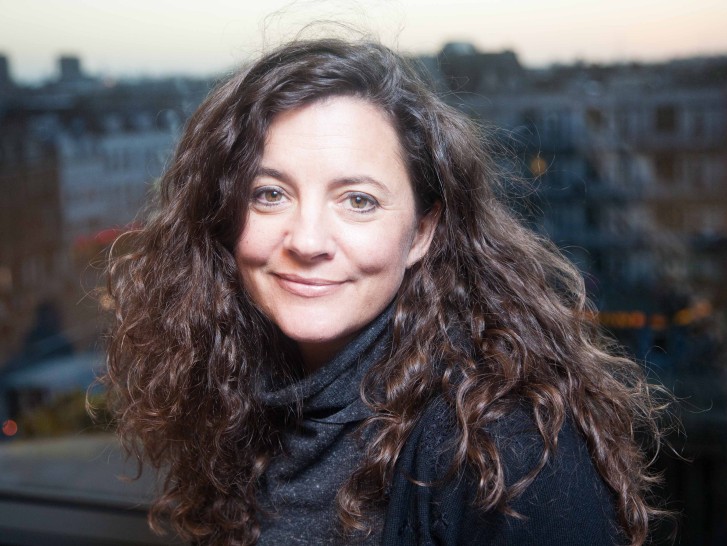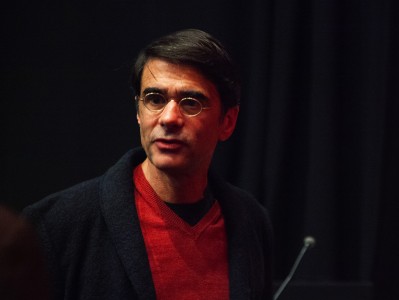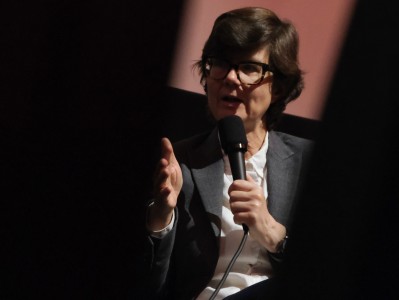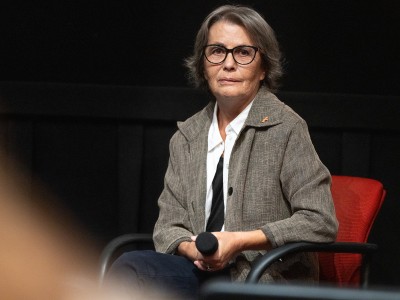
First Comes Love post-screening discussion with David Pendleton and Nina Davenport.
Transcript
John Quackenbush 0:00
July 18, 2013. The Harvard Film Archive screened First Comes Love. This is a recording of the Q&A that followed the screening. Participating are HFA Programmer, David Pendleton and filmmaker, Nina Davenport.
David Pendleton 0:20
Please welcome Nina Davenport and the star of First Comes Love, Jasper Davenport!
[APPLAUSE]
David Pendleton 0:41
How do you guys want to…?
Nina Davenport
Well, Jasper is gonna want to–
Jasper Davenport
Hello everybody!
[LAUGHTER]
David Pendleton
Maybe I'll start by asking a question or two. One thing that fascinates me is that it's such a personal and intimate film, and yet you're on screen so much that clearly there are the additional cinematographers that you talk about, that you mentioned in the credits. I'm wondering how much of the film did you shoot yourself? Who are these additional cinematographers? Was there a certain point at which you realized—at which you were shooting things sort of in a diaristic kind of way—and then realized that this was a film and brought in other people to help you shoot things? Or were these other people in the film that are shooting?
Nina Davenport 1:27
Well, first to back up a little, the idea for the film occurred, like almost immediately on the heels of the idea of having a baby on my own. And that's because I had made this film Always a Bridesmaid about my love life in 2000. This very personal film about being a wedding videographer wishing I were the one walking down the aisle, which led to some awkward moments on some of my jobs, as you might imagine, including there's a scene where a bride turns to me and says, “Are you going to come with me the whole way?” walking down the aisle. [LAUGHS] I was little overeager as a wedding videographer anyway! I'd made that personal film, so then I felt Okay, here I am. This is such a common or increasingly common story of women in my generation who were freaking out about their biological clocks, can’t find Mr. Right, blah, blah, blah. And so, you know, I know how to make personal films. I kind of felt like I had to do it. So I filmed everything from the beginning. But I also knew, you know, if I got pregnant, that my body would be changing and would be like a character in the film in a way, so I also needed to be on camera, to some extent. So it was a combination of people I hired and friends, like my friend Mikaela here. I think she's the one who shot the scene where Amy and I are doing the first IVF shot and where I'm like showing all the– I think I said something like, “Are they trying to make me create an army of babies?” Which they are, by the way, that's another story. Anyway, so she shot that. Yeah, so it was from the beginning.
David Pendleton 3:09
My other question is about on the other hand, like showing the film to people, like it must be difficult for you– Or for me, it would be difficult to show this to people because it's such a personal film. I feel like the responses to this film must be very personal at the same time. And I'm wondering what it's like for you to negotiate people judging the film versus people judging you or the choices that you've made in the film. I mean, is that something that you've encountered so far in the reaction to the film?
Nina Davenport 3:39
I mean, my only experience so far is at film festivals, starting with Toronto in September, and I've never felt anything but just this outpouring of love and respect and a feeling of connection and people feeling inspired and remembering their own childhoods and talking about– I mean, I had someone come up to me crying and saying that the film made her see her father in a more forgiving light. And I mean, I've had like a lot of people coming up to me crying about things in their own lives. I mean, so far, there's no downside. I mean, you know, when it airs on HBO on July 29, maybe I'm gonna get some family values people leaving me threatening messages, who knows? But I kind of doubt even that, because I think that there's just so much love in the film that even if you're a hater, it would be hard to hate. So I'm not I'm not really worried about it.
David Pendleton 4:49
Do you want to say a little bit about the your kick–?
[JASPER STARTS TALKING TO NINA]
Nina Davenport 4:52
[TO JASPER] I'm here, sweetie. Yes, yes, definitely. Well, we'll talk about it.
He wants to see Elizabeth’s children. I love the no-boundaries, like no-awareness he's in an audience! It's amazing. That's gonna end soon: four and a half. So…
David Pendleton 5:11
[LAUGHING] And has Jasper been a part of the Q and A's at many other–?
Nina Davenport 5:13
Well, you know, I brought him to some Q and A's and invariably, there's a huge, full on nuclear tantrum right the second before I'm supposed to go on. [LAUGHTER] So then I'm like, I'm never doing that again. But then I feel bad because I want him to be part of it, because I think it's fun for him. So I don't know. But I think opening night in New York, maybe not.
David Pendleton 5:35
Does he have an opinion about the film?
Nina Davenport 5:39
Well, actually, the last screening was at the Nantucket Film Festival, and he watched like, forty-five minutes of it. And the running commentary and questions was so priceless that I realized, I'm going to do a DVD commentary with Jasper of the film. It's a great idea! It was things like, “Was I born yet? When do I get born?” [LAUGHS] So, and then giggling whenever he was on screen, that was pretty cute. But, I think it's gonna be when he's older, and someday watches it as an adult. It's gonna be pretty amazing. I mean, imagine if you could sit down and watch a documentary of like, of you when you were just an idea, you know, a notion that two people were talking about and then being born. I mean, it's gonna be amazing. And also, it's a way he'll see what my mother was like, and so I feel like in a way, it's a glorified baby book, which is something I kept in mind in the edit room all the time.
David Pendleton 6:48
One thing that you don't include is the you as a filmmaker or you making the film that we're watching and thinking about something, like some of Ross McElwee’s films, for instance, where we also see, to a certain extent, like some of the filmmaking choices. I'm wondering about your decision to sort of bracket that out of the film. In other words, it's very much a personal film about you deciding to have a child, but there's nothing about the decision to make a film about having a child. And I'm wondering if that was a conscious choice on your part to sort of bracket that out, for the most part, or if it just seemed to–
Nina Davenport 7:27
I think that kind of self-referential thing can be great. And it's kind of when it works, it's my favorite thing ever. But I think you've got to have a good reason to not just sort of like plunge people right into the story. And I didn't feel like there was a reason in this case. And there were so many other things to establish at the beginning of the film, that, you know, because it has so many characters, and it goes in directions you don't anticipate, which is always in the edit room, something you have to deal with early on. I mean, if a film kind of changes directions, the hard part of the editing is at the beginning to sort of in some ways, signal that or introduce the elements that come out later, or whatever. So to just add that whole layer to it seems unnecessary in this case, whereas with my last film, Operation Filmmaker, the fact that I was making a film really affected the subject of the film and became part of the content, but that was appropriate. I don't know if anyone here… Some people have seen it.
David Pendleton 8:39
Are there questions in the audience? We have microphones for those of you so we can all hear.
Nina Davenport
I might be able to hear… We can probably hear though, even if there's no microphone.
David Pendleton
There's Clarabel in the back, and then there's a couple of people up here.
Nina Davenport
How about someone in the middle? Yeah.
David Pendleton 8:55
Hang on, [Jasper].
Audience 1 8:59
What's your relationship with your dad today, and does he help financially support you? Because I saw a lot of tension around money and your job.
Nina Davenport
Yeah. He– Oh, okay. Jasper has a question.
Jasper Davenport
Ummmm… Hello everybody.
Nina Davenport 9:21
Alright. I would say my relationship with him is what you see in the film. It ebbs and flows. I sometimes I'm better at being sympathetic. Other times, I'm not. And, you know, it's just the way the way it is with family where you kind of… You mature and then you regress, you mature and you regress. But he's doing well, he's eight-four. And he is really like physically, emotionally just strong person. I mean, I admire that more and more as the years go on. And the financial thing was very confusing and tricky to figure out how to deal with in the film. And it's something that I feel like, is a topic that you know, people don't talk about. And yet it's so common in families for there to be tension around money. So I sort of like tried to cut that back to the bare minimum. And I almost wanted to not have it be in there at all. But they’re so inextricable—approval and money in my family—that even when I tried to keep that out of the conversation, he would bring it in. So it was just really hard from the point of view of editing. And I did have an intention really, originally to have it be a bigger part of the film. But, he helps me financially in the sense that, you know, I had money that I inherited, because he gave us money and blah, blah, but he doesn't help me because I'm a single mother. It's like, he's happier giving my brothers money, who have like tons and tons of it, because he feels like they deserve it. He tries to be fair with me, but he doesn't feel like I deserve it. So it's complicated. But I'm fine. You don't have to worry about me if that's what you're getting at. My child's going to public school, and he's going to do fine. I'm very happy about it. I'm sure it'll end up at Harvard anyway. Don't worry about it. I got it all taken care of! No, just kidding. Anyway, yes. Next question.
David Pendleton 11:40
There was a question over here on the side, but also Clarabel had a question in the back if you want to... And there's also one up here.
Audience 2 11:52
Two short questions. Where did you get the name Jasper? And watching the film and the plight of Detroit—if you don't know, well, it's known all over the world, the plight of Detroit. But how was Jasper gonna know about that, about the economy in Detroit?
Nina Davenport 12:13
I mean, well, Jasper was in my family tree, and I loved it, and I didn’t know anyone with that name. But now every time I go to a playground in Brooklyn, there are a lot of Jaspers around suddenly and I'm not happy about it! [LAUGHS]
But yeah, the plight of Detroit, I mean, I like that that’s sort of hinted at in the background with the Ford, but it's not really the film and I have to admit that I'm extremely jealous of the women —who are also friends of mine—who made Detropia, which I have not seen, but I'm really jealous that they got to spend time in Detroit and make a film about Detroit, because it's so fascinating. And if I do find an idea, a topic there, I'm going to do it because it would be a way to spend more time with my dad, too.
You guys can just– I think you can just talk. I don't think you need to wait for the microphone. Yes, you had a question. White shirt.
David Pendleton 13:13
Just shout it out.
Audience 3 13:17
[INAUDIBLE]
Nina Davenport
Well, I mean, the film that really gets to that is Operation Filmmaker. That film was all about that. But with this film, I mean, obviously, I didn't even know if I was gonna get pregnant. Yeah, I was wondering, the whole time really is “Do I have a film? Is anyone going to really care about my dumb life?” You know, so I actually filmed a lot of single mothers, as kind of as backup in case my own story didn't really hold up. But I ended up– You know, very few of them are actually in the final cut. I mean, when I showed the card to Nancy Abraham at HBO, at one point, there were a bunch of single mothers together. And she was really interested, laughing and having a great time, and then as soon as we got to that, she's like, “When is this gonna–? When are we done with these single mother scenes?” So it's kind of the opposite of what I thought. She was really interested in the personal part. That's HBO, you know, so that kind of signified something, but I still clung to the idea of having them, because I felt it was important to have some of them, but that they needed to be integrated in a more personal and organic way to my life. I don't think I first saw that my father would be such a significant part of the film. I didn't know that I had all of those home movies—my grandfather's home movies. Yeah, and in general to just speak more generally to making documentaries and specifically personal documentaries, it's a journey. I mean, the best films, the filmmaker doesn't actually know what the hell they're doing and they're sort of going on instinct. And that's at least how I work. And it's always kind of like a surprise and a miracle when lo and behold, like you actually knew what you were doing. But you don't realize that until like, three years into it, if not four.
By the way, that's Rob Moss in the back—one of my teachers, who's the one who got me into this. [APPLAUSE] Robert Gardner was here too, but he left. I don't know other… Anyway, I do know a lot of faces here. It's so nice to see everyone. It's really weird to be here, oh my god. I watched all the greatest movies in this room. And then my sister in law, the awesome sister in law who’s telling me that I should quote, put down the camera and go get pregnant, her parents are in the back. [APPLAUSE] Oh, and Mikaela. Oh my god, Mikaela was in the– Well, I sort of introduced her earlier. The line of “Even with six breasts on the scene, we still can't figure out how to do this.” She was the one in that scene. And she's an official auntie of Jasper.
Yes.
[INAUDIBLE AUDIENCE QUESTION]
Nina Davenport 16:24
First of all, I don't think that my dad is self-absorbed. Actually the men who I date tend to be so much more self-absorbed, the men in our generation. I mean, like he provided for his children, provided for his wife, was loyal to his wife, and he saw that as his duty. And now men basically do whatever the hell they want. So, I mean, it's all relative. I'm just saying, I think you have to look at him from the point of view of the time period he was of, and that's sort of what I'm trying to get at the end where he was doing what everybody else was doing. And, you know, he's not that capable of change, but he did accept Jasper. But I think, you know, to ask someone to evolve a lot from eighty to eighty-four, it happens, but it's unusual.
[INAUDIBLE AUDIENCE QUESTION]
Nina Davenport
No, no, no, I call it Baby Daddy! I still do. I'm trying not to, but it's a habit that I can't seem to break.
[INAUDIBLE AUDIENCE QUESTION]
Nina Davenport
I mean, a lot of people just don't let me film ever. So, you know, that's really more what happens, and I tend to like the people who've left me film. A, because they're letting me film, and that's what I really want to do with my spare time, for whatever reason. And because I feel like it just shows a real openness of spirit to just be willing to put it out there. And who cares? If people are gonna judge you, let them. That's how I feel, and that's how some of my friends are. And then I have others who don't let me film. So that's more the issue. You know, like the two single mothers, two really close friends who had babies on their own before me, they actually didn't let me film. So these other women are kind of stand-ins for that. But with Eric and Amy, where I was filming them so much, it was wearing at times on our relationship. It was hard because I'm trying to get something and they aren't always in the mood to give it. And so, sometimes there was tension, but then on the other hand, sometimes Amy would be like, “We really should be filming this conversation. You need to get out the camera.” [LAUGHS] So, they've fully participated. And I filmed so much of Mikaela. Oh my god, hours and hours and hours. And tragically, it got cut down to very little. She's happy, but I feel like it's a tragedy. So, hopefully that– Heather! Hi!
[INAUDIBLE AUDIENCE COMMENT]
Nina Davenport
Thank you.
[INAUDIBLE AUDIENCE QUESTION]
Nina Davenport
Well, I think it has a lot to do with the transition from film to video. I mean, I shot Always a Bridesmaid on film and you know, whatever your format you're shooting on—the camera, the stock, whatever you want to call it, all of that—should inform what story you tell and how you tell it. So, I hate to say it, but yeah, I mean, it partly comes down to: film is still more beautiful. I mean, with incredibly good lighting and incredibly expensive cameras, you can make video look like film, but that's like big budget stuff. But then there's also the fact that ultimately it is the story and you have to make it work. And, it just wasn't the kind of film where there was room for sort of long, kind of filmic poetic moments in between as much.
So yeah, I guess that's my answer.
Thank you guys for coming. I'm also willing to chat with anyone outside or if anyone wants Jasper's autograph. [LAUGHTER[ He can't exactly write. Well, no, he can write his name. You could. Jasper could give anyone his autograph if they want it. Thank you so much.
[APPLAUSE]
©Harvard Film Archive
Related film series
Explore more conversations
Christoph Hochhäusler

João Moreira Salles

Melissa Anderson

Rita Azevedo Gomes

